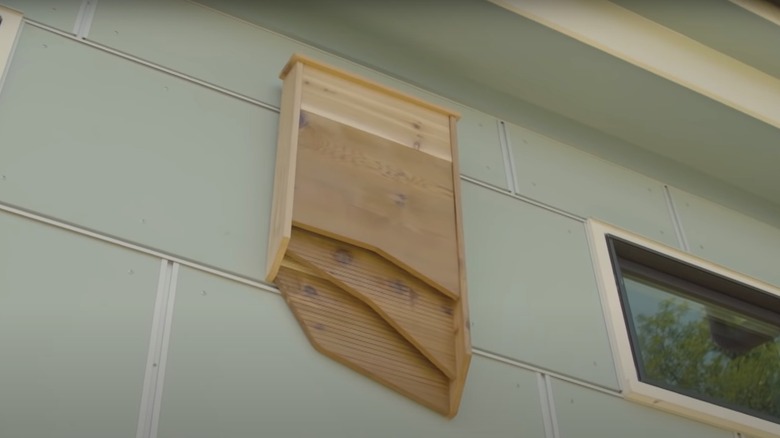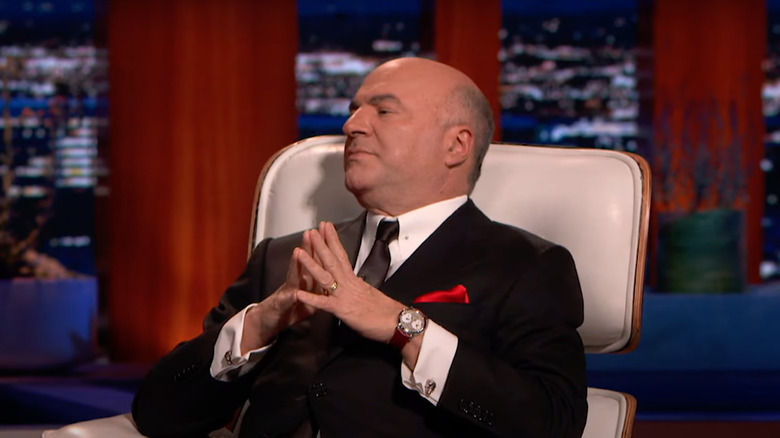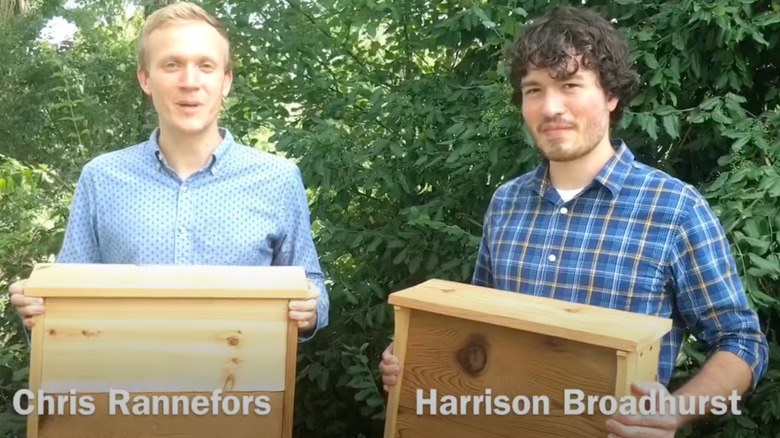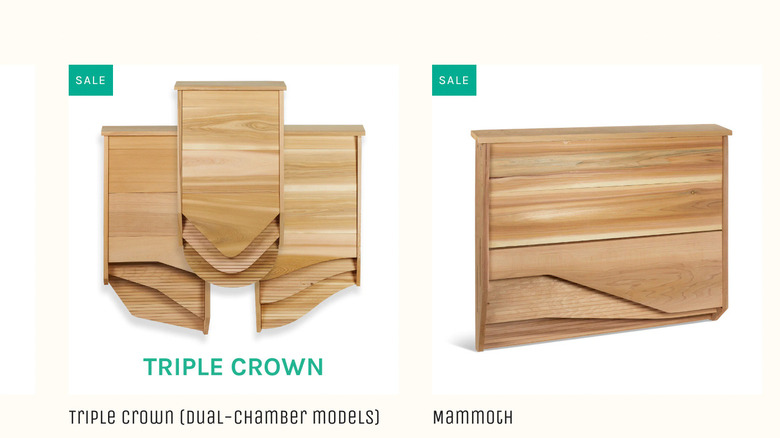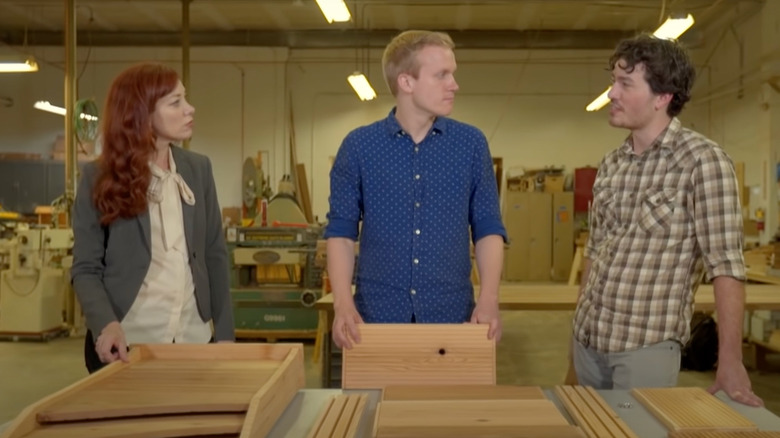Whatever Happened To BatBnB After Shark Tank Season 10?
ABC's "Shark Tank" never fails to open our eyes to new and exciting products, and BatBnB is no exception. In season 10, episode 23, BatBnB founders Harrison Broadhurst and Chris Rannefors presented their business to "Shark Tank" investors. Forming the idea in 2016, the two friends were concerned with the overuse of pesticides in the environment but recognized the importance of controlling pest populations. Rather than continue to use harmful chemicals, Broadhurst and Rannefors designed habits to shelter bats in backyards, allowing them to stop pests like mosquitoes, crickets, moths, and beetles from infiltrating homes and gardens. And with many bat species endangered or rapidly approaching it, the product helps to solve more than one environmental problem.
The duo entered the tank with less than a year of being in business and asked for a $100,000 investment for 16% equity. By the end of the pitch, they only managed to have one shark, Kevin O'Leary, on the hook, making them an offer.
BatBnB on Shark Tank
Broadhurst and Rannefors start the pitch by explaining how much of an issue mosquitos pose to our environment and health. The consistent pesticide use to fend off these insects don't do any favors for people or wildlife — which is why bats are the perfect solution. "Most people don't know that a common bat will eat up to a thousand mosquito-sized insects an hour, making them one of nature's greatest forms of natural pest control," Rannefors told the Sharks. "With our line of designer bat houses, you can significantly reduce your backyard pest population. Every BatBnB is designed with the animal's unique habitat in mind."
When asked by the Sharks, the founders explain that each unit could host 80 to 100 bats at a time. Production costs were $88.50 per piece, and they sold them at $249. At the time, the business owners had $135,000 in revenue and expected to reach $145,000 by the end of the year. By the end of the pitch, all judges but one passed. Robert Herjavec felt it seemed like a "hobby market," while Lori Greiner stated, "It's just not the product for me." O'Leary, however, saw the potential, saying that bats are misunderstood creatures and that with the right marketing, the business could flourish. He offered Broadhurst and Rannefors $100,000 with 33.3% equity, and while they were hesitant to take the deal, they accepted.
What came next
After their time on "Shark Tank," the BatBnB deal never completely closed with O'Leary; however, the business stayed afloat. Since Broadhurst and Rannefors made their appearance on the ABC show, both founders were featured in the 2020 edition of Forbes 30 Under 30 and have spoken on podcasts and been featured in other publications like USA Today, Mother Nature Network, and NPR.
Additionally, Broadhurst and Rannefors were featured on "How I Built This with Guy Raz" and "Innovation Nation with Mo Rocca" shortly after their "Shark Tank" appearance, advertising their business and continuing to explain away the misconception of bats. "BatBnB in its simplest form is a perfectly designed home for an increasingly misunderstood and increasingly threatened animal that also turns out to be incredibly beneficial to us," Rannefors said on Innovation Nation. Broadhurst said, "A lot of people think that all bats suck blood, and they don't," with Rannefors finishing up that thought, saying, "It's really only the vampire bat that only lives in Central America and primarily only feeds on cattle."
How has BatBnB grown since Shark Tank?
Today, BatBnB's business is still thriving, having grown its team to include Head of Community Engagement and Partnership Jessica Woodend, Product Designer Blake Rippe, Video Production Lead Emily Stanford, and Graphic Designer Liz Keiser. Broadhurst has taken on the role of Design and Fabrication, with Rannefors heading Marketing and Operations. The company also works closely alongside famed ecologist and wildlife photographer Merlin Tuttle, who has more than 60 years of experience working with bats. It is listed as an approved vendor of bat habitats by the Merlin Tuttle Bat Conservation.
The products are now sold in 50 states and 13 countries, and the company offers seven different units, including the Mammoth, which can hold between 200 and 240 bats at a time. Prices vary, ranging from $175 to $375, with packs of two or three priced between $459 to $715. The BatBnB website features an array of items alongside the bat habitats, such as plushes, cards and stickers, bat detectors, books and guides, clothing merchandise, and house signage.
Where BatBnB and its founders are now
BatBnB and its team continue to make environmental sustainability a priority, creating bat homes from eco-friendly Western Red Cedar while using responsible production practices like carbon offsetting. According to its website, the company has sheltered over 600,000 bats and educated millions of people. Broadhurst and Rannefors are also taking opportunities to go on shows and podcasts like "Beat The Often Path with Ross Palmer" to continue spreading awareness for their cause. The company website and social media pages are frequently updated with facts, how-to guides, and blog posts educating customers on how to help support bat populations.
Although BatBnB isn't going anywhere anytime soon, the founders have both kept full-time occupations outside of their business. Broadhurst is a senior designer at The Galante Architecture Studio, and Rannefors is head of the North American mid-market sales team at Shopify. You can keep up with Broadhurst, Rannefors, and their BatBnB adventures on their socials, @batbnb on Instagram and Facebook, and @thebatbnb on Twitter.
